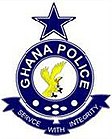Ghana Police Service
| Ghana Police Service | |
|---|---|
| Common name | Ghana Police Service |
| Abbreviation | GPS |

Ghana Police Service patch depicting the service logo
|
|

Logo of the Ghana Police Service
|
|

Shield of the Ghana Police Service
|
|
| Motto | Service With Integrity |
| Agency overview | |
| Formed | 1894 |
| Preceding agencies |
|
| Employees | 32,684 (30 June 2011) |
| Legal personality | Governmental: Government agency |
| Jurisdictional structure | |
| National agency | Republic of Ghana |
 |
|
| Map of Ghana Police Service's jurisdiction. | |
| Size | 238,530 square kilometres (92,098 sq mi) |
| Population | 24,233,431 |
| Governing body | Government of Ghana |
| Constituting instruments |
|
| General nature | |
| Operational structure | |
| Headquarters | Accra, Greater Accra, Ghana |
| Sworn members | 23,684 (30 June 2011) |
| Unsworn members | 9,000 (30 June 2011) |
| Minister responsible | Ambrose Dery, Minister for Interior |
| Agency executive | David Asante Apeatu, Inspector General of Police |
| Units |
15
|
| Regions |
10
|
| Facilities | |
| Stations | 651+ |
| Website | |
| www |
|
| Footnotes | |
The Ghana Police Service (GPS) is the main law enforcement agency of Ghana. The service is under the control of the Ghanaian Ministry of the Interior, and employs over 30,000 officers across its 651 stations.
The Ghana Police Service operates in twelve divisions: ten covering the ten regions of Ghana, one assigned specifically to the seaport and industrial hub of Tema, and the twelfth being the Railways, Ports and Harbours Division. An additional division, the Marine Police Unit, exists to handle issues that arise from the country's offshore oil and gas industry.
The current head of the Ghana Police Service is Inspector General of Police (IGP) David Asante Apeatu. For each of the regional police divisions, there is a Regional Commander who is in charge of all operational and administrative functions under his jurisdiction. In direct operational matters, the Regional Commander furthermore works in tandem with the Regional Operational Commander. For administrative functions, the Regional Commander is assisted by the Deputy Regional Commander and the Regional Crime Officer. The Deputy Inspector-General of Police is assisted by the Director-General of the Police Administration, and supervises the activities of the regional commanders of police.
Apart from the National Police Headquarters, all the regional divisions have subdivisions under them. The aim of this is to decentralize the activities of the regional police force for more effective and flexible policing. Each regional command is divided into divisional commands. The various divisional commands are headed by Divisional Commanders, who are in charge of the district commands under them. The individual district commands are, in turn, headed by District Commanders. The District Commanders have direct control and supervisory responsibilities over all police stations and posts under their jurisdiction.
The twelve regional divisions exercise oversight responsibilities over 51 divisions, which have 179 district divisions under them. The districts have jurisdiction over a national total of 651 police stations.
There are, furthermore, specialized police units in all the regional divisions. The Regional Commander has oversight over these units. These units include:
...
Wikipedia
